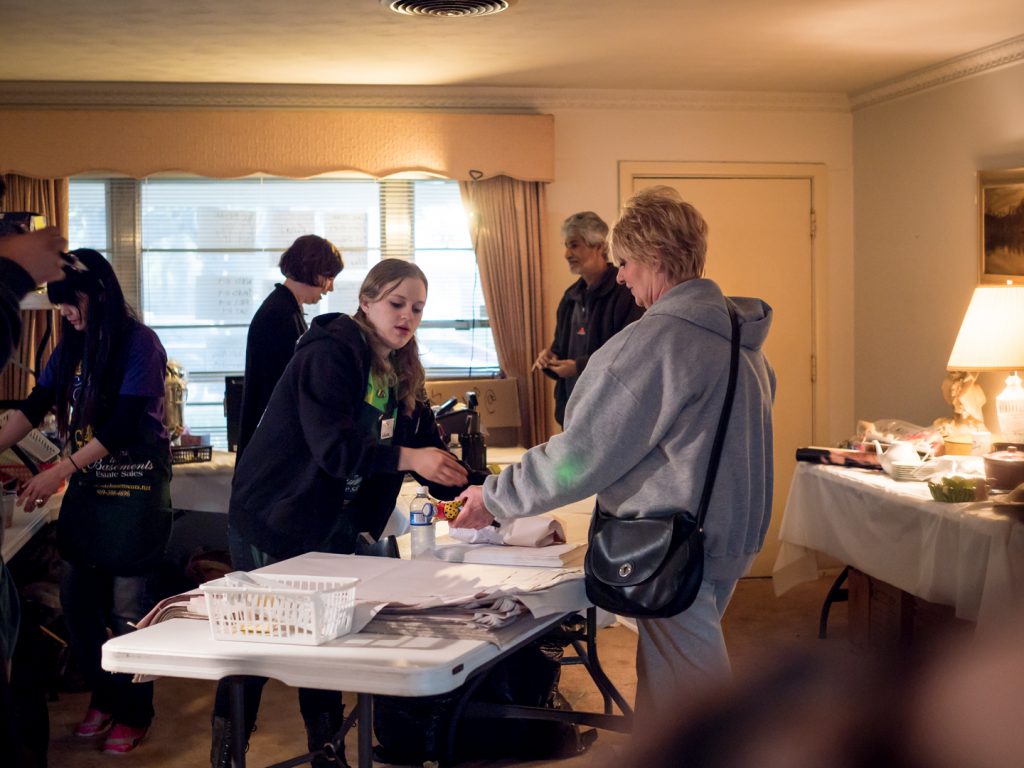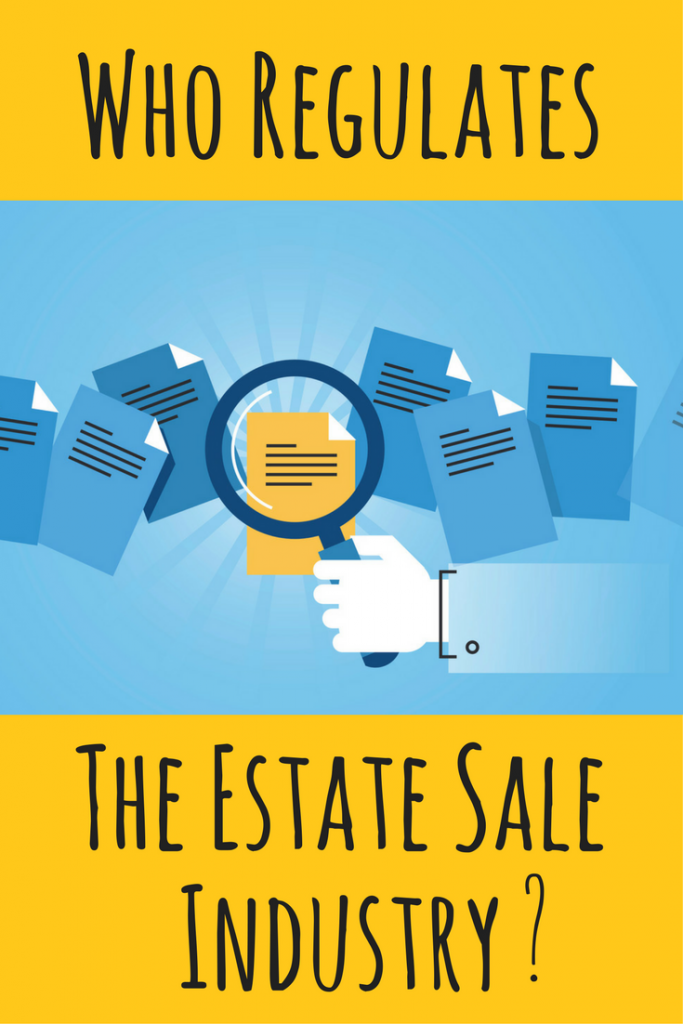Estate sale industry regulations are a complex issue. The matters of personal property have always been…personal. When it comes to people’s things, the old cliche is often true: one person’s trash is another one’s treasure. But can just anyone determine what “treasures” are truly worth? On one hand, it’s a mid-century Kroehler sofa; on the other it’s the very spot where someone’s father proposed back in 1955, a lifetime of memories.
Selling vintage and other personal belongings can be a tricky business, which is why most industries have imposed governing boards that protect both the buyer and the seller when entering into a financial agreement. In fact, to sell just about anything, whether you’re hawking hot dogs or selling a house, you need a license. Realtors must pass a state real estate license exam to sell real estate. Auctioneers go through formal training and usually are required to get hands-on experience through an apprenticeship, depending on the state. Even appraisers, in order to value personal property, must pass a series of courses for certification.
However, the estate sale industry, an industry made up of close to 14,000 operating estate sale companies nationwide and growing, doesn’t have a formal licensing board to answer to. There’s no one to govern the so-called Wild West.
What some people are wondering is: why not?
Baby Boomers, Google, and the BBB
While hiring an estate company may have once been a matter of every (wo)man for himself, the industry has gotten more complicated with time. The grandparents are dying off, Baby Boomers are downsizing, and those of us who are left have a lot of “stuff” to deal with.
Not only that, consumers of all ages are savvier these days, thanks to the Brave New World on the Internet. Most people do a considerable amount of “Googling” before buying anything at all. This includes looking up where to eat on a Friday night, finding which exterminator offers the best deal, comparing banks to find the most competitive rates — and yes, choosing who to hire to sell off the things your late mother left behind.
With a growing list of reputable estate sale companies, the question arises of whether or not the industry — both people in need of an estate sale company and estate sale companies themselves — needs a way to verify and affirm a company’s credentials.
Of course there’s the Better Business Bureau, and most solid estate sale companies do belong to their local BBB. But if this were enough, why wouldn’t it be good enough for the industries that require formal training and licensing? It seems today’s consumers need something more than referrals and testimonials to prove accountability.
“When the question to government regulate or not to regulate is raised, consumer protection is typically the motivator,” Cindy Illig Lum of The TimeFinders, LLC wrote on EstateSale.org’s Facebook Group, The Estate Sale Company Network.
The people who might benefit most are the ones who need to hire an estate sale company, sometimes in a pinch. Consignors often are going through some sort of life change: divorce, downsizing, or death. They don’t have the time or emotional wherewithal to check individual references amid the upheaval. In their vulnerable state they may fall victim to the few bad apples that, as in any industry, prey on people at their worst.
Licensing, one might argue, could offer both a convenience and a safeguard to the consignor faced with liquidating an estate, a way to vet the more experienced companies from the less qualified.
Lum continued in her post, “There also seems to be a fear on the part of estate sale company owners that the competition is getting too stiff and we need to thin it out. I think before we call for regulation, we need a better analysis of the ‘problem.’ What agencies/groups are in a position to perform the analysis? Once we clearly identify what we are trying to fix, then we can better define the solution.”
Indeed some estate sale companies feel the industry standards should be left well enough alone, a sort of “if it ain’t broke” mentality. As Marian Brown Kirby Ough of Quality Estate Sales stated via The Estate Sale Company Network, “This has always been a word of mouth business and if you aren’t ethical and do a responsible job for the family, you won’t be in business very long. “
The viewpoint is valid. Imagine you’ve been running a successful business for over twenty years, paying your dues, and acquiring highly specialized knowledge that can only be picked up working in the field, just to be told years later that you have to join some outside organization to be considered “legitimate” — and not only that, you have to pay dues.
Another issue with regulation is the cost. Expert Estates owner and author of The Estate Sale Business Kit Lisa Kroese pointed out, “The issue with the creation of federal regulation is how greatly it increases the costs of operating a business and that those costs will have to be passed on to consumers. Many liquidators operate on tight margins already.”
Unfortunately, the solution, like the problem, isn’t so simple.
Estate Sale Company Associations: ASEL, NAOEL, and NESA
For now, the estate sale community has come up with a solution by taking matters into its own hands. Self governing organizations like the American Society of Estate Liquidators (ASEL), in business since 2001, and more recently, the National Association of Estate Liquidators (NAOEL) and the upcoming National Estate Sale Association (NESA) seek to impose order on the rapidly expanding industry. While not official licensing entities, these groups provide education and support, from a tiered certification program, to courses in business basics and more advanced subjects, like appraisal and pricing. Both ASEL and the NAOEL also provide members with contracts and documents necessary for conducting business, as well as in person and over the phone support to help with sales and logistics. NESA is a non-profit trade association and plans to include education and training modules in the future, as well.
The Estate Lady and the Matriarch of Metro Atlanta
While the world of auctions may be driven by men, women tend to get things done in the estate sale industry. ASEL Director Julie Hall and NAOEL Director Donna Davis have been in the business for decades. You could call them both veterans, who not only have entrepreneurial know-how of running an estate sale company — from pricing and organizing a sale, to managing a team and clients — they have accumulated the sort of knowledge you can’t just pick up from a book or online course. In fact, they can price just about anything, from rare antiques and art, to everyday items. You name it, and they can probably tell you how much it’s worth in your regional market — and if not, where to find out.

“Research is a huge part of this business: knowing how to research and the correct way to research the price — that’s very important and being able to back up your pricing, too. And having the data’s not enough. You’ve got to know how to interpret the data,” said Davis.
It’s this sort of hands-on expertise that can benefit a growing industry. Both Davis and Hall have capitalized on their talents to fill the void left by a lack of an official accreditation process, bringing very different backgrounds and life experiences to to an industry they both love. In addition to a love of estate sales and provenance, they have one thing in common: the desire to organize chaos.
“You don’t go into this industry unless you sleep, eat, and breath it. You love the ability to go into a mess and make something really special out of it and organize it and display it. We thrive on working with the client and helping them through to the next part of their life,” said Hall.

It’s a business, you can imagine, that not everyone is cut out for.
“It is just crazy how many people get in [this business], and if we don’t have any way to set ourselves apart, that we’ve gone through the extra steps and have been tested by somebody, that somebody stands behind that we’re a good company — at least as far as what our criteria is — then there’s nothing to separate us from somebody that just started,” said Davis.
The reality is people running estate sale companies are selling someone’s stuff, just as a realtor or auctioneer might, and thus held to professional standards.
“I was a licensed auctioneer and I had to go to school. I had to take a test, I had to get an auctioneer’s license because I collected people’s money and I had to keep a record of what was sold,” said Davis. “Well, that’s no different than was an estate sale company does, and there’s nobody to oversee what we’re doing!”
NESA: A Non-Profit Trade Association
In the summer of 2014, a group of eight experienced estate liquidators from around the country met to discuss forming the National Estate Sales Association (NESA), a non-profit association for the estate sale industry. Participants included Martin Codina, author of the book Liquidating an Estate, Berenice Denton, Daniel Sanders, Todd Hughes, and Ashley Wheeler Glass.
Since then, the board has grown to 10 companies committed to developing a not for profit association they believe will benefit the industry. NESA’s 501(c)6 non-profit filing status allows for transparency, as the association and board are guided by By-Laws and Articles of Incorporation that will be publicly filed, and accessible for anyone to see.
NESA plans to officially launch later this year.
“As a group, we believe that generally estate liquidators across America are doing the best they can to operate as ethically as possible without government regulations of industry practices and behavior,” said Martin Codina. “We further believe that fostering open communication in our competitive work environment amongst service providers is in the best interest of estate sale companies, their clients, and the future of the profession.”
Establishing Credibility in the Industry
Many estate liquidators have resumes that include antique dealing, appraisal and pricing, selling real estate and auctioneering — highly specialized yet vast knowledge — and can remember when an estate sale company’s tenure could speak for itself, back when things were as simple as word-of-mouth marketing.
But if there’s one thing that keeps the estate sale industry booming, it’s that nothing stays the same.
“People don’t care enough anymore that you’ve done the business for eight to ten years, or for fifteen years — everybody says that! There’s so many of us out there that have done it a long time that now it’s just not as important. And that’s why we need something to distinguish ourselves from everybody else getting in the business,” Davis said.
It was this same idea that drove Julie Hall to join ASEL in the early 2000s. Since taking over in 2007, her mission has been simple: to help estate sale companies and consumers with a “360 degree approach.”
“From 2007 to today [the industry] has really grown by leaps and bounds. My vision was to offer not only education to newcomers — because if you’re going to do it, do it right and do it ethically. But it was also to be there as a support system and ongoing education for those that are midway through their careers. They’ve been in it a few years and they need help building business,” said Hall.

Organizations like ASEL, NAOEL, and NESA are especially helpful to new companies just starting out. Fledgling businesses often don’t know where to begin or how to find support. These newcomers could benefit from a clearly defined path that outlines the appropriate steps needed for success. Furthermore, newer companies need access to resources and a community of peers and mentors, especially because knowledge spans a myriad of subjects that can take a lifetime to acquire.
“[It’s] an industry that is very tactile and visual. You have to handle things and look how things are made. Is it pressed glass or cut crystal? Is it a reproduction or an original?” said Hall. “The best way to learn as you go is to really throw yourself into it. Some people also like to take appraisal courses, so they’re getting even more of an education. But you’ve got to get out there to understand what today’s personal property is worth — because so much has changed.”
Other Estate Sale Company Resources
The recent cropping-up of other accreditation organizations only adds to a newcomer’s learning curve. With no official licensing board, which organization has the most clout? Which offers the best resources? Which is worthy of the yearly dues?
One anonymous estate sale company owner who has been in business for almost three years uses the wide net approach.
“I just listed myself under whatever organizations I could when I started my company. I don’t know the difference between all of them. I don’t know what I pay, to be honest. But I just wanted to be on them in case people do searches. The more places I’m involved in and the more names I have behind me, the better — it’s more about the online presence and advertising.”
When asked what she felt she got out of her memberships, she admitted she wasn’t quite sure. “One sends out newsletters and those are helpful.”
Despite paying yearly dues, (one organization offered a discount, she noted, although she wasn’t sure which one), she couldn’t say exactly what she was getting for her money aside from the ability “to be found.”
Among the newer estate sale accreditation organizations are the Estate Sale Association (ESA) (Ed. note: the ESA website was temporarily disabled at the time of publication) and the Estate Sale Board of America, which are both easily found on the Web.
To Regulate or Not to Regulate?
For now, regulation of the estate sale industry doesn’t seem the answer — at least not yet. With reputable organizations like ASEL and NAOEL having stepped up, and NESA on the way, they are laying the groundwork for other organizations that seek the same end: a safe and lucrative industry.
Does that mean eventual government regulation?
“I think because the industry has been around a very long time, and so many people do it their own individual ways, I think [regulation] can be done, I just don’t know who will do it. I think it’s going to be hard to do,” Hall said. “I don’t know why it’s not regulated. I think it’s getting to a point where the industry is getting more and more recognition in the press.”

What do you think? Do you think the estate sale industry should be regulated? Why or why not? Let us know your thoughts in the comments!



